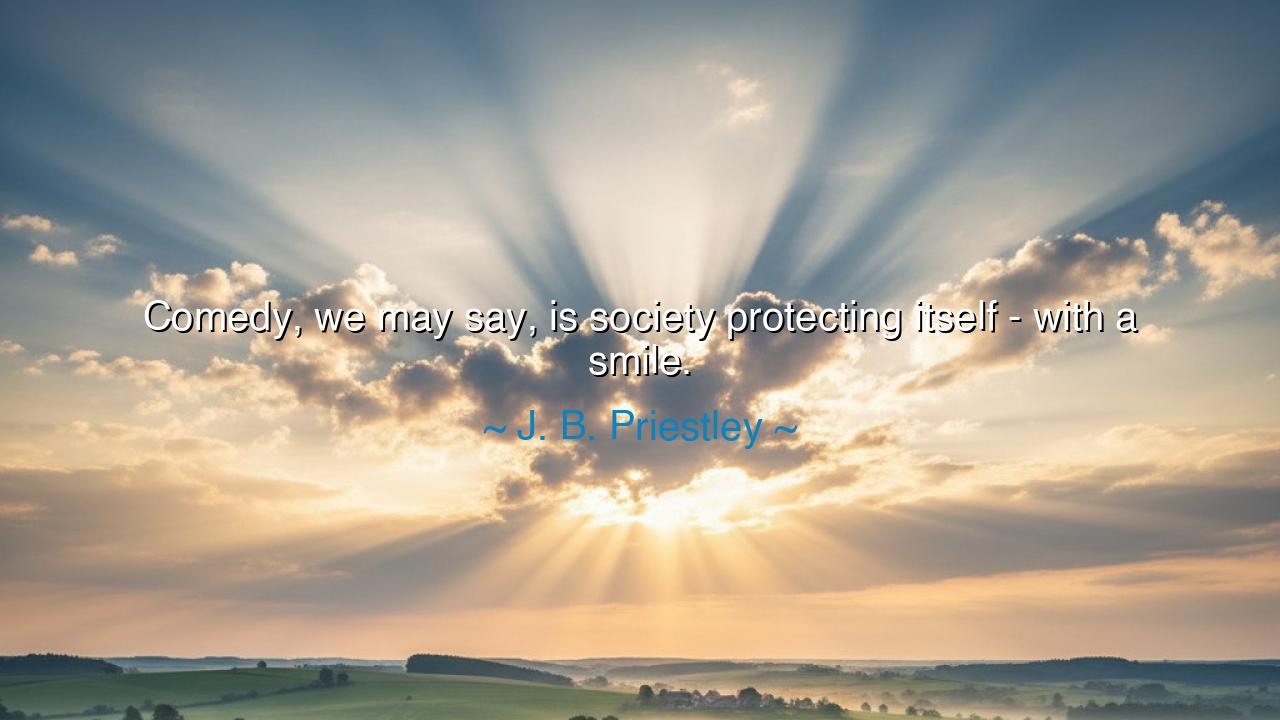
Comedy, we may say, is society protecting itself - with a smile.






Hearken, children of the ages, and attend the wisdom of J. B. Priestley, who proclaimed: “Comedy, we may say, is society protecting itself—with a smile.” Consider this truth: the laughter of a people is not mere frivolity, nor is it a distraction from hardship. Rather, it is a shield, a mirror, and a voice of resilience. Through comedy, society confronts folly, exposes injustice, and tempers conflict, all while preserving the bonds that hold it together. In the gentle curvature of a smile lies the power to endure, to correct, and to enlighten.
In the courts of ancient Athens, the dramatists understood this profound function. Aristophanes, whose comedies lampooned politicians, generals, and citizens alike, wielded laughter as both weapon and shield. The audience, entertained by jest, simultaneously absorbed lessons in humility, justice, and vigilance. Here, Priestley’s insight is manifest: comedy is a force by which society protects itself, using amusement as the medium for reflection and correction.
Consider the life of Abraham Lincoln, a leader confronting a nation divided by civil war. Even amid the gravest trials, he employed gentle humor to diffuse tension, to unify, and to illuminate human folly without provoking resentment. By smiling at the contradictions and absurdities around him, he created space for empathy and understanding. In this, Lincoln exemplifies Priestley’s teaching: comedy safeguards the social fabric, fostering cohesion and perspective even in peril.
Even in times of conflict, the protective power of comedy is evident. During the First World War, soldiers turned to dark humor and playful banter to survive the horrors of the trenches. Their laughter did not diminish danger, but it created a buffer, a space in which camaraderie, courage, and sanity could persist. Comedy, Priestley reminds us, is society’s armor: it absorbs the shocks of adversity while allowing the human spirit to endure.
Yet, the lesson of Priestley is subtle: comedy is not merely ridicule, nor is it cruelty masked as amusement. It is discernment applied to the imperfections and contradictions of human life. It protects not by silencing criticism, but by framing it in a form that educates, persuades, and inspires reflection. Through comedy, the faults of society are revealed, but the bonds of community are strengthened rather than broken.
History offers another illustration in the life of Charlie Chaplin. Through films such as Modern Times and The Great Dictator, he exposed the follies of industrialization, inequality, and tyranny. Audiences laughed, yet beneath the humor lay piercing truths about the social order. Chaplin’s artistry demonstrates Priestley’s principle: comedy allows society to confront its own failings with a smile, to correct without annihilating, and to enlighten while delighting.
Children of the ages, the lesson is clear: cultivate the ability to perceive, share, and appreciate comedy not as mere entertainment, but as a safeguard for society and the soul. Observe the absurdities, contradictions, and follies of life, and allow laughter to illuminate them with insight and compassion. In doing so, you become both participant and guardian of a world in which humor strengthens bonds, tempers conflict, and nurtures wisdom.
Practical action follows naturally. Seek moments to reflect on the ironies and absurdities of human endeavor, share stories that reveal folly with kindness, and allow laughter to guide discussion and understanding. Encourage humor in teaching, leadership, and fellowship, using the smile as both shield and beacon. In this way, as Priestley teaches, comedy is society protecting itself—with a smile, preserving the integrity of the human spirit while illuminating the path to wisdom and justice.






AAdministratorAdministrator
Welcome, honored guests. Please leave a comment, we will respond soon